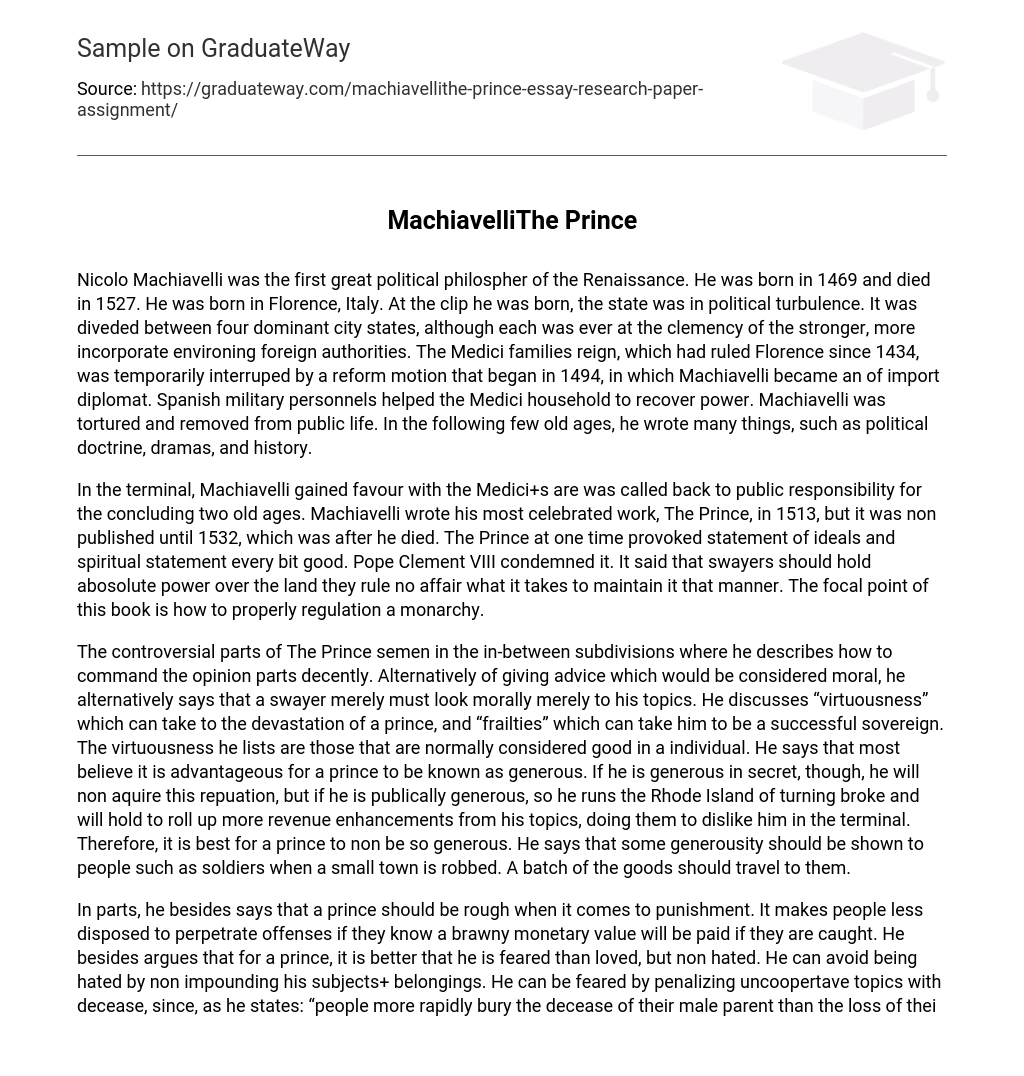Nicolo Machiavelli was the first great political philospher of the Renaissance. He was born in 1469 and died in 1527. He was born in Florence, Italy. At the clip he was born, the state was in political turbulence. It was diveded between four dominant city states, although each was ever at the clemency of the stronger, more incorporate environing foreign authorities. The Medici families reign, which had ruled Florence since 1434, was temporarily interruped by a reform motion that began in 1494, in which Machiavelli became an of import diplomat. Spanish military personnels helped the Medici household to recover power. Machiavelli was tortured and removed from public life. In the following few old ages, he wrote many things, such as political doctrine, dramas, and history.
In the terminal, Machiavelli gained favour with the Medici+s are was called back to public responsibility for the concluding two old ages. Machiavelli wrote his most celebrated work, The Prince, in 1513, but it was non published until 1532, which was after he died. The Prince at one time provoked statement of ideals and spiritual statement every bit good. Pope Clement VIII condemned it. It said that swayers should hold abosolute power over the land they rule no affair what it takes to maintain it that manner. The focal point of this book is how to properly regulation a monarchy.
The controversial parts of The Prince semen in the in-between subdivisions where he describes how to command the opinion parts decently. Alternatively of giving advice which would be considered moral, he alternatively says that a swayer merely must look morally merely to his topics. He discusses “virtuousness” which can take to the devastation of a prince, and “frailties” which can take him to be a successful sovereign. The virtuousness he lists are those that are normally considered good in a individual. He says that most believe it is advantageous for a prince to be known as generous. If he is generous in secret, though, he will non aquire this repuation, but if he is publically generous, so he runs the Rhode Island of turning broke and will hold to roll up more revenue enhancements from his topics, doing them to dislike him in the terminal. Therefore, it is best for a prince to non be so generous. He says that some generousity should be shown to people such as soldiers when a small town is robbed. A batch of the goods should travel to them.
In parts, he besides says that a prince should be rough when it comes to punishment. It makes people less disposed to perpetrate offenses if they know a brawny monetary value will be paid if they are caught. He besides argues that for a prince, it is better that he is feared than loved, but non hated. He can avoid being hated by non impounding his subjects+ belongings. He can be feared by penalizing uncoopertave topics with decease, since, as he states: “people more rapidly bury the decease of their male parent than the loss of their inheritance.” Machiavelli besides says that a prince should be able to be fallacious when it can assist him derive advantage. This is likely the most controversial subdivision of The Prince. When being fallacious, he must be descreet about it. He must ever exhibit five virtures even if he is non truly.
These virtuousness are mercy, honestnes, humaneness, uprightness, and piousness. A prince must be avoid being hated at all costs. The best manner to avoid being overthrown is by avoiding being hated. In many subdivisions of The Prince, Caesar Borgia, a dispised autocrat of Spain was praised by Machiavelli. When Machiavelli was a diplomat, he was in contact with Borgia a batch. Although it ne’er clearly states that Borgia is the ideal sovereign, many believe that. Many others used to construe The Prince as a sarcasm on Borgia and swayers such as him because it showed the great disfavor of Machiavelli for arbitrary power. This theory was discarded in 1810 with a missive by Machiavelli which stated that he wrote The Prince to endear himself to the Medici household and to emancipate Italy from foreign authorities. A batch of his points say that authorities from the state being ruled are really of import, no affair what.





